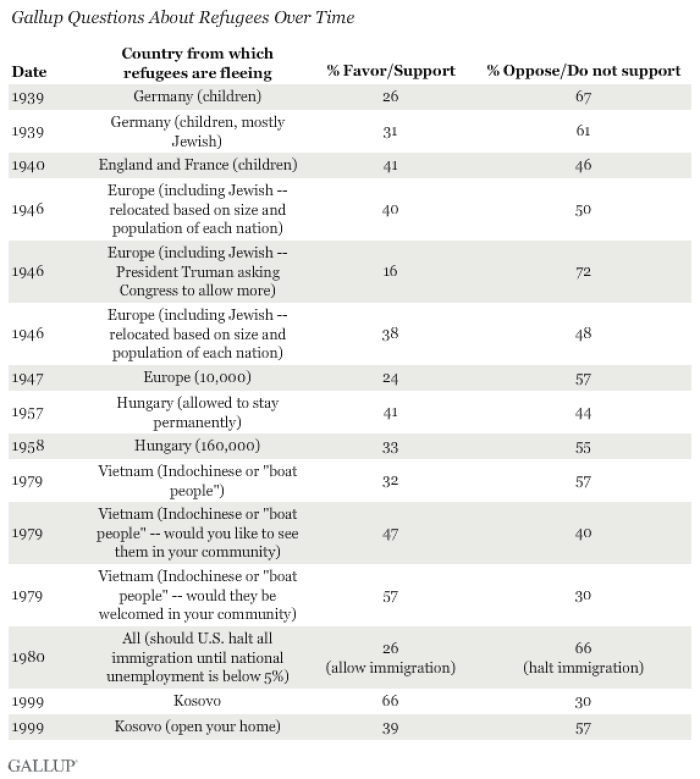American Opposition to Refugees Not New, Polling Shows

The terrorist attacks in Paris have resulted in a renewed focus on the previously announced plan by the Obama administration to relocate 10,000 refugees from Syria to the U.S. Various Republican candidates and many state governors have expressed concern over the policy in the wake of the attacks, with as many as 26 governors announcing that their states will not accept Syrian refugees — although their legal or practical ability to prevent the refugees from coming to their state is unclear.
President Barack Obama has fought back against these reactions and defended his policies, saying, "We are not well served when, in response to a terrorist attack, we descend into fear and panic."

This, of course, is not the first time that Americans have been faced with the issue of dealing with refugees fleeing some form of oppression or political reprisal in countries around the world.
In 1939, Gallup was asking the nation about their reactions to proposals to allow refugees from Nazi Europe to enter the U.S. In the years since, Gallup has asked Americans about World War II refugees, refugees attempting to flee from Hungary after the 1956 Soviet crackdown on protests there, refugees fleeing from Vietnam after the communist takeover in the mid-1970s and refugees from Albania in the late 1990s.
Overall, a review of these attitudes shows that Americans have a general reluctance to accept refugees into the U.S., even in response to situations that are clearly oppressive.
Gallup's first questions about refugees were asked in January 1939, just a couple of months after the Nov. 9-10 events, which came to be known as Kristallnacht, when Nazi party officials, Hitler Youth and other Germans carried out waves of violence against Jewish synagogues, cemeteries, businesses and Jewish residents in their homes. The events accelerated the attempts of European Jews to flee Germany and proximate countries and to immigrate to nations such as the U.S.
The basic question Gallup asked related specifically to refugee children: "It has been proposed that the government permit 10,000 refugee children from Germany to be brought into this country and taken care of in American homes. Do you favor this plan?" A second question asked of a different sample was basically the same as above, but included the phrase "most of them Jewish" and ended with, "should the government permit these children to come in?"
It didn't matter much whether or not the refugee children were identified as Jewish. A clear majority, 67% of Americans, opposed the basic idea, and a lower 61% were opposed in response to the question that included the phrase "most of them Jewish."
This opposition reflected, in some ways, Americans' strong isolationist attitudes at this juncture in history.

Separate Gallup polling in December 1939, after the war began with the German invasion of Poland, showed a startling 96% of Americans said the United States should not declare war on Germany and send the Army and Navy abroad to fight. In early 1940, 77% said that the U.S. should not get involved, even if it "appears that Germany is defeating England and France."
A separate Gallup question in June 1940 — still a year and a half before Pearl Harbor was bombed and the U.S. entry into the war — asked if Americans would be willing to take care of one or more refugee children from England and France in their home until the war was over. Attitudes in response to this question were more mixed, but still with a slight plurality saying they opposed — 46% against, 41% in favor.




























